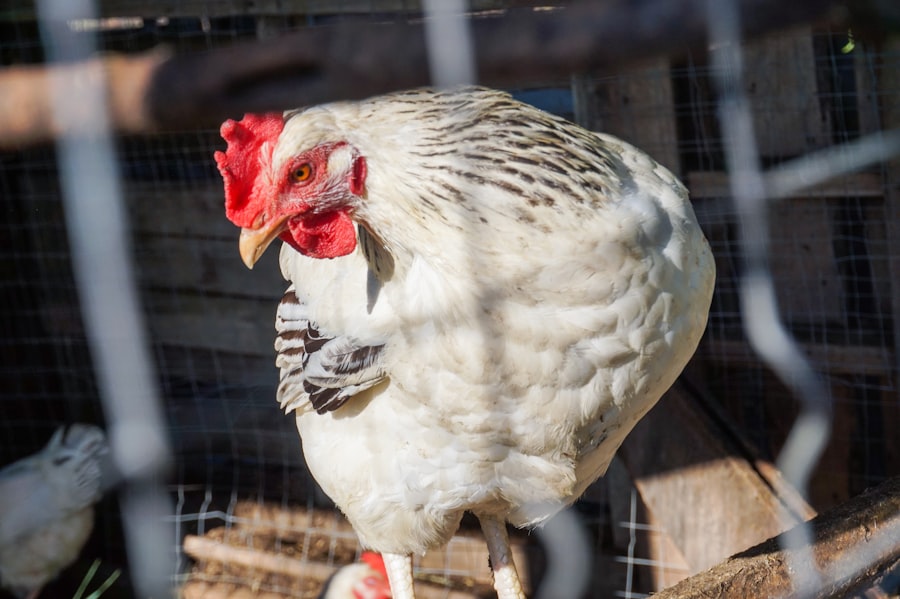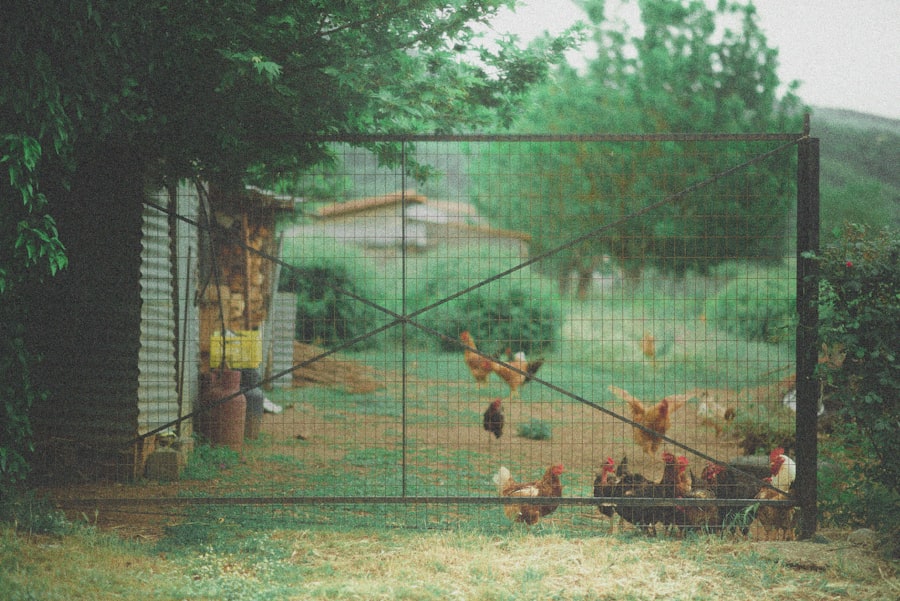Chickens are inherently social creatures that flourish in group settings. They establish a hierarchical structure known as the pecking order, which determines dominance and submission among individuals. Comprehending this social dynamic is essential for maintaining harmony within the flock.
Chickens also exhibit natural behaviors such as foraging for food, engaging in dust baths, and roosting at night. Providing an environment that accommodates these instincts is crucial for reducing stress and promoting overall well-being. Communication among chickens occurs through various means, including vocalizations, body language, and pecking.
Observing and interpreting these signals is vital for assessing the flock’s health and contentment. For instance, excessive pecking or aggressive behavior may indicate overcrowding or stress, while relaxed body language and contented clucking suggest a satisfied and healthy flock. By gaining insight into chicken behavior, poultry keepers can design coops and runs that cater to the birds’ needs and foster a peaceful environment.
Table of Contents
- 1 Building a secure coop
- 2 Using proper fencing
- 3 Providing adequate food and water
- 4 Regularly checking for escape routes
- 5 Keeping chickens entertained and active
- 6 Monitoring and addressing any signs of stress or aggression
- 7 FAQs
- 7.1 What are some common reasons why chickens escape?
- 7.2 How can I prevent chickens from escaping?
- 7.3 What are some effective fencing options for keeping chickens from escaping?
- 7.4 How can I deter predators from causing chickens to escape?
- 7.5 Are there any natural deterrents to prevent chickens from escaping?
Key Takeaways
- Chickens have natural behaviors such as scratching, dust bathing, and roosting that should be understood and accommodated in their living environment.
- A secure coop with strong and predator-proof materials is essential to protect chickens from harm.
- Proper fencing, including buried wire to prevent digging, is crucial to keep predators out and chickens safe.
- Providing adequate food and water, as well as keeping the feeding and watering areas clean, is important for the health and well-being of chickens.
- Regularly checking for escape routes and reinforcing any weak spots in the coop or fencing is necessary to prevent chickens from wandering off or being attacked by predators.
- Keeping chickens entertained and active with toys, perches, and space to roam can help prevent boredom and behavioral issues.
- Monitoring and addressing any signs of stress or aggression in chickens, such as feather pecking or bullying, is important for maintaining a harmonious flock.
Building a secure coop
Sturdy Construction and Ventilation
When building a coop for your chickens, security should be your top priority. The coop should be sturdy and well-ventilated, with solid walls and a predator-proof roof. It’s important to use high-quality materials that can withstand the elements and keep predators out.
Secure Entry Points and Space Allocation
The coop should also have secure latches and locks to prevent any unwanted intruders from gaining access. The size of the coop is also crucial for the well-being of the flock. Chickens need enough space to move around comfortably, roost, and lay eggs. Overcrowding can lead to stress, aggression, and health issues.
Essential Features for Comfort and Health
Additionally, the coop should have nesting boxes for the hens to lay their eggs and perches for roosting at night. By building a secure and spacious coop, you can provide a safe and comfortable environment for your chickens to thrive.
Using proper fencing

In addition to a secure coop, proper fencing is essential for keeping your chickens safe from predators and preventing them from wandering off. The fencing should be tall enough to prevent predators from jumping over or digging under it. It should also be sturdy and durable to withstand any attempts at breaching it.
Additionally, the fencing should have small enough gaps to prevent predators from reaching through and grabbing a chicken. It’s also important to consider the type of fencing material. Chicken wire is a popular choice for keeping chickens contained, but it may not be strong enough to keep out determined predators.
Hardware cloth or welded wire mesh are more secure options for fencing in your chickens. By using proper fencing, you can create a safe outdoor area for your chickens to roam and forage while keeping them protected from potential threats.
Providing adequate food and water
Proper nutrition is essential for the health and well-being of your chickens. A balanced diet of high-quality chicken feed, supplemented with fresh fruits, vegetables, and grains, will ensure that your flock receives all the essential nutrients they need to thrive. Additionally, access to clean and fresh water is crucial for hydration and overall health.
It’s important to provide enough feeding stations and waterers to accommodate the size of your flock. This will prevent competition and aggression over food and water. Regularly cleaning and refilling the feeding and watering stations will also help prevent the spread of disease and ensure that your chickens have access to clean and fresh resources.
By providing adequate food and water, you can promote the health and happiness of your flock.
Regularly checking for escape routes
Chickens are curious creatures that may try to find ways to escape their enclosure. Regularly checking for any potential escape routes is crucial for preventing your chickens from wandering off or becoming vulnerable to predators. Inspect the fencing for any gaps, holes, or weak spots that could allow chickens to slip through or predators to gain access.
It’s also important to check the coop for any openings or loose fittings that could allow chickens to escape. Secure any potential escape routes promptly to ensure the safety and security of your flock. By regularly checking for escape routes, you can prevent any potential mishaps and keep your chickens safe and contained.
Keeping chickens entertained and active

Enrichment Activities for Happy Chickens
Providing enrichment activities such as hanging treats, perches, dust bathing areas, and toys can keep your chickens entertained and engaged. This not only prevents boredom but also reduces stress and aggression within the flock.
Outdoor Access for Active Chickens
Allowing your chickens access to a spacious outdoor run with plenty of room to roam, scratch, and forage will also keep them active and healthy. Rotating their access to different areas of the yard or providing them with new items to explore can keep them engaged and prevent destructive behaviors such as feather picking or pecking.
Promoting Overall Well-being and Happiness
By keeping your chickens entertained and active, you can promote their overall well-being and happiness.
Monitoring and addressing any signs of stress or aggression
It’s important to regularly monitor your flock for any signs of stress or aggression. This can include excessive pecking, feather picking, lethargy, or changes in vocalizations or behavior. Addressing these signs promptly can prevent further issues within the flock.
If you notice any signs of stress or aggression, it’s important to identify the underlying cause and take steps to address it. This may involve providing more space, reducing overcrowding, adding enrichment activities, or separating aggressive individuals from the rest of the flock. By monitoring and addressing any signs of stress or aggression, you can maintain a peaceful and harmonious environment within your flock.
In conclusion, understanding the behavior of chickens is crucial for creating a safe and harmonious environment within the flock. Building a secure coop with proper fencing, providing adequate food and water, regularly checking for escape routes, keeping chickens entertained and active, and monitoring and addressing any signs of stress or aggression are all essential for the well-being of your flock. By implementing these practices, you can ensure that your chickens are happy, healthy, and safe in their environment.
If you’re looking for more tips on keeping chickens from escaping, check out this article on choosing the right floor for your chicken coop. It offers valuable insights on how to create a secure and comfortable environment for your chickens to prevent them from escaping.
FAQs
What are some common reasons why chickens escape?
Chickens may escape due to a lack of proper fencing, overcrowding, or the presence of predators. They may also escape in search of food, water, or better shelter.
How can I prevent chickens from escaping?
To prevent chickens from escaping, ensure that your coop and run are properly secured with high-quality fencing and hardware cloth. Regularly inspect the fencing for any signs of wear or damage. Additionally, provide adequate space, food, water, and shelter to reduce the likelihood of escape.
What are some effective fencing options for keeping chickens from escaping?
Some effective fencing options for keeping chickens from escaping include hardware cloth, welded wire fencing, electric poultry netting, and chicken wire. It’s important to choose a fencing option that is sturdy and secure to prevent chickens from escaping.
How can I deter predators from causing chickens to escape?
To deter predators from causing chickens to escape, install predator-proof fencing and consider using motion-activated lights or sound deterrents. Additionally, secure the coop and run with locks and latches to prevent predators from gaining access to the chickens.
Are there any natural deterrents to prevent chickens from escaping?
Some natural deterrents to prevent chickens from escaping include planting thorny bushes or installing barriers such as rocks or logs to create obstacles for the chickens. Additionally, providing enrichment activities and a well-maintained environment can reduce the likelihood of escape.
Meet Walter, the feathered-friend fanatic of Florida! Nestled in the sunshine state, Walter struts through life with his feathered companions, clucking his way to happiness. With a coop that’s fancier than a five-star hotel, he’s the Don Juan of the chicken world. When he’s not teaching his hens to do the cha-cha, you’ll find him in a heated debate with his prized rooster, Sir Clucks-a-Lot. Walter’s poultry passion is no yolk; he’s the sunny-side-up guy you never knew you needed in your flock of friends!







